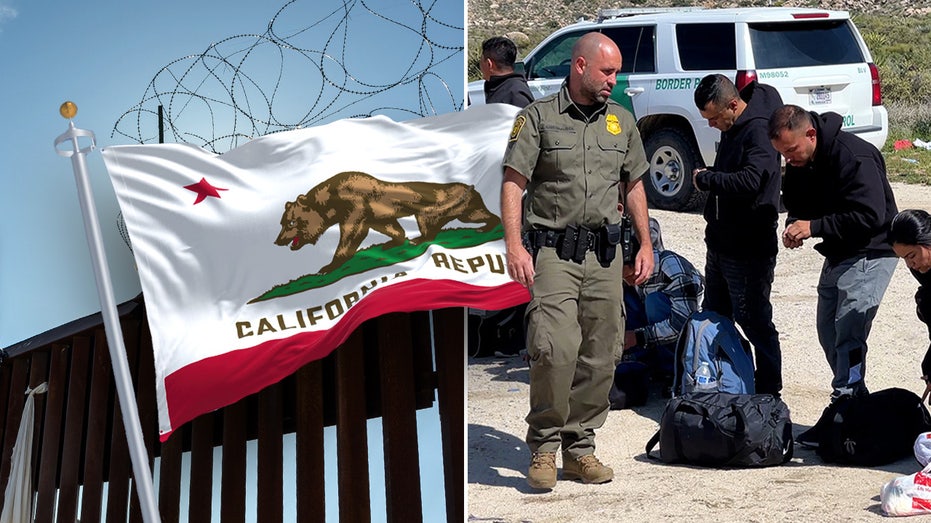Surging border crossings are putting a strain on communities in Southern California, where hordes of migrants are often spotted at transit hubs after immigration officials resumed street releases, local politicians say.
“There’s no end in sight,” San Diego County Supervisor Jim Desmond told Fox News. “This is a new norm, which I think we’re going to get a rude wake-up call someday.”
Migrants’ first days in Southern California often follow a similar schedule.
After going over, around or through gaps in the border fence, they surrender to Border Patrol agents. Maybe it’s immediate, maybe they have to wait on the side of the road for a few hours to be caught, or maybe they make a dangerous trek through mountains that Customs and Border Protection warns range from snow-covered in the winter to perilously hot and dry in the summer.
They get searched, processed at a CBP facility tucked amid truck repair shops and car auction businesses, and released. The majority — but not all — get dropped off at local transit stations, Desmond said, gone from San Diego County before many residents have even registered their arrival.
“A lot of them are going to the East Coast,” Desmond said of the folks he has spoken to at the border. “So a lot of them leave. But there’s a lot we don’t know.”
WATCH MORE FOX NEWS DIGITAL ORIGINALS HERE
Located about 15 minutes from downtown San Diego, El Cajon has become one of a handful of drop-off sites for migrants. Mayor Bill Wells said the border has “always been a problem,” but the federal government always made an effort to prevent “bad actors” like cartels and gang members from entering the country.
“Now the gates are wide open,” Wells told Fox News. “We’re no longer even trying.”
The San Diego sector saw an 85% increase in encounters in February compared to the same month last year, according to CBP data. Agents there made more than 230,000 encounters during fiscal year 2023, a record 2024 is on track to shatter.
While the Biden administration promises “our borders are not open,” those on the front lines describe a contradictory scene. Border Patrol agents are overwhelmed with “give ups,” people who walk across the border and claim asylum so they can be detained, processed and then released into the United States.
“I don’t blame the Border Patrol agents,” Desmond said. “Their hands are tied.”
Both Wells and Desmond have documented crowds at local transit stations. Desmond said CBP releases between 600 and 900 people on a given day, usually at locations that lack bathrooms and other amenities. Sometimes nonprofits or “entrepreneurial” taxi drivers are there waiting, he said.
“Unfortunately, San Diego Airport now has become the de facto migrant shelter, where they sleep there,” he added, estimating that around 90% of migrants continue to other cities around the country like Chicago or New York. “Hopefully a lot of them leave. But we have no, really, idea of if they do or not.”
Until late February, migrants would likely have been taken to a vacant elementary school-turned processing center in San Diego. But the $6 million in county funding that was supposed to sustain the center from October through March ran out early, after processing 81,000 migrants, according to local news reports.
The Board of Supervisors approved a plan to seek federal dollars and charitable donations to fund a replacement center to stem the tide of street releases. Desmond cast the sole “no” vote, arguing a long-term shelter would just be complicit in the federal government’s mess.
“What we’re allowing is a very undignified and inhumane process where people have to come over a 30-foot fence … [or] through a river,” he said. “We should enforce our laws and have a legal, dignified immigration process.”
Americans increasingly rank immigration as the most important problem facing the United States. In California, nearly two-thirds of likely voters surveyed earlier this year by the Institute of Governmental Studies at the University of California, Berkeley, said the border is not secure enough.
Californians Fox News spoke with largely said border security was an important voting priority for them and that they support immigration so long as it’s done legally.
“If you have a fence around your house, if you lock your door at night, then we don’t need to explain to you the value of having a border fence. It’s not rocket science,” Mark Good said.
Good‘s son-in-law spent five years waiting to immigrate to the U.S. from Bangladesh “the right way,” he said.
“Then you see people coming over the border and getting given things,” his wife Pat said. “It’s hard. I feel bad for them, but it’s hard.”
Wells, who is running for Congress, and other local leaders initially worried there would be a surge of migrants on the street after the welcome center closed. That hasn’t happened yet, he said, speculating that private organizations and nonprofits have been able to get migrants on planes and buses fast enough to keep up with the influx.
“Pretty soon the system is going to be overwhelmed to the point where there’s not going to be enough money to send people everywhere they want to go,” Wells worried.
With homeless shelters already full, he said migrants could end up on the streets.
“Everything is already full because of the migrants and the homeless people that have flocked to California in the past couple of years,” Wells said. “So there’s very little in the way of safety net in California.”



